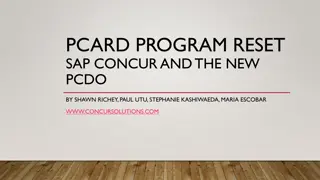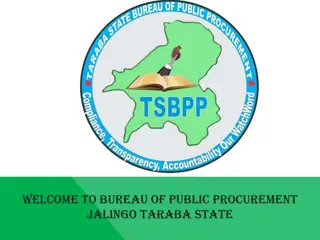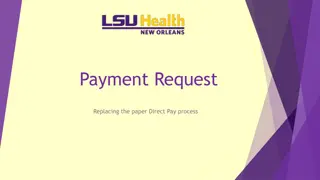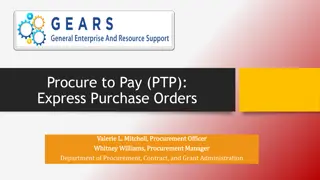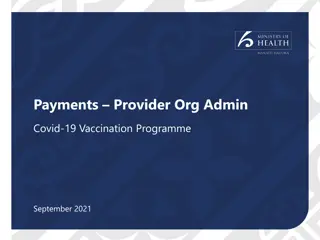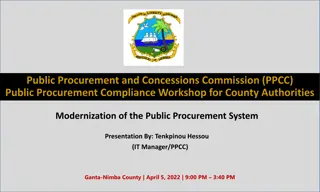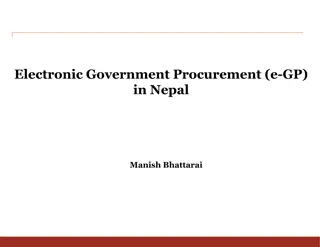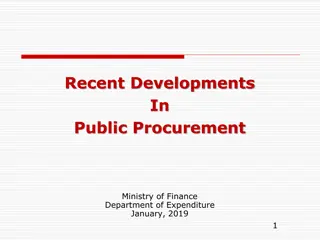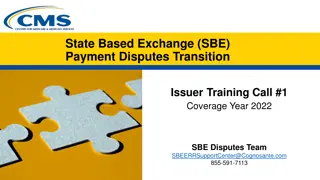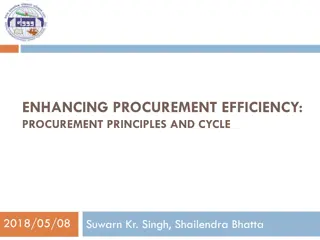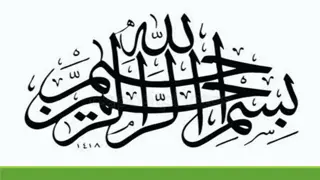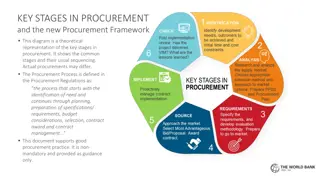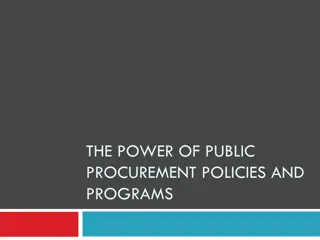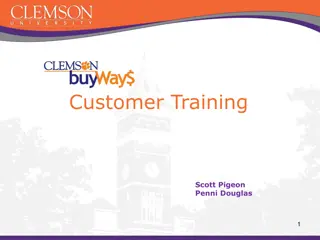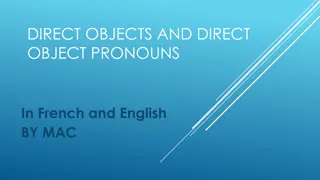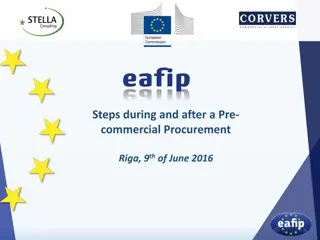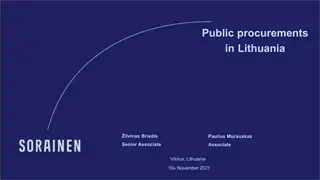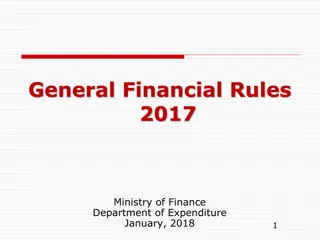Pilot Program for Mandatory Direct Payment in Procurement Framework
The Pilot Program for Mandatory Direct Payment aims to address payment risks affecting procurement competition, particularly in challenging environments. Under this program, projects meeting specific criteria must use the Direct Payment method, enhancing the participation of contractors, suppliers, and consultants. The program covers projects funded under IDA18 and targeting fragile and conflict-affected states, with a focus on fostering competition and reducing payment-related challenges.
Download Presentation

Please find below an Image/Link to download the presentation.
The content on the website is provided AS IS for your information and personal use only. It may not be sold, licensed, or shared on other websites without obtaining consent from the author. Download presentation by click this link. If you encounter any issues during the download, it is possible that the publisher has removed the file from their server.
E N D
Presentation Transcript
2016 PROCUREMENT FRAMEWORK Mandatory Direct Payment & Beneficial Ownership PRIVATE SECTOR SEMINAR April 2018
Regulatory Framework Articles of Agreement IBRD & IDA Policy: Core Procurement Principles Procurement Regulations Standard Procurement Documents 2
Mandatory Direct Payment
Background Increased concern that payment risks are affecting competition Bank s commitment to continue supporting effective procurement by improving the participation of contractors, suppliers, consultants (regardless their nationalities) The Bank launched a mandatory Direct Payment Pilot as part of a broader effort to foster competition in particularly difficult environments and will be monitored and evaluated for its effectiveness 4
Scope of the Pilot Pilot applies to IPF projects under preparation, which meet the following criteria: i. financed under IDA18, and ii. triggers paragraph 12 of Section III of the IPF Policy (fragile and conflict-affected states/situations and small states - FCS) and iii. the Decision Review is held on or after November 1, 2017 Borrowers will not have a choice of disbursement method. Unless the Special Commitment disbursement method is used, borrowers are required to use the Direct Payment method for disbursement under contracts for goods, works, or non-consulting services and consulting services procured/ or selected through international (open or limited) competition or Direct Selection 5
Which selection methods are subject to this Pilot? All approaching the international market (with open or limited competition) and direct selection In addition, considering that the objective of the pilot is to improve the participation of contractors, suppliers, consultants (regardless their nationalities), it is expected that the decision on whether this Pilot also covers Direct Selection awards to national firms and individuals should be made taking into account specific risks for payment associated with low-capacity environment, governance issues, etc. The procurement plan shall reflect these decisions 6
Pilot Coverage Approach facilitates monitoring and management of unexpected consequences Hands on Expanded Implementation Support (HEIS) is available to borrowers in fragile and conflict-affected states/situations and small states Through HEIS, the Bank may help borrowers to advance procurement 7
Operationalization and M&E Changes/updates to: Disbursement and Financial Information Letter (DFIL) IPF Instructions for the preparation of FCS projects and Additional Financing Processing Instructions for IPF Guidance on preparing Minutes of Negotiation Standard Procurement Documents (SPDs) An M&E framework has been designed to monitor progress of the pilot Around the same principles of (and will be integrated with) the overall M&E framework of the Procurement Framework Quantitative and qualitative data will be collected to monitor performance and to identify factors that may have a positive or negative impact on success 8
Background Increased demand for transparency in World Bank-IPF procurement Bank SPDs requires bidders to identify general B/O related information: identity (name, legal form and proof of existence), organization chart, board of directors Tracking B/O is new to public procurement and there is no international consensus yet Extensive consultations with other MDBs and stakeholders, among others: Financial Action Task Force (FATF), DFID, Open Contracting Partnership, Open Corporates, Transparency International Jurisdictions reviewed include the US, UK, EU, etc. The Bank is at the forefront of developing this approach 10
B/O Pilot A three-year pilot including all projects with decision to appraise held on or after November 1, 2017 The winning bidder -over the OPRC thresholds- is required to identify the Beneficial Owner before contract signing using a B/O Disclosure Form Beneficial Owner is any natural person who ultimately owns or controls the bidder by meeting one or more of the following conditions: directly or indirectly holding 25% or more of the shares; directly or indirectly holding 25% or more of the voting rights; directly or indirectly having the right to appoint a majority of the board of directors or equivalent governing body of the bidder 11
B/O Pilot Winning bidders have three options (see the B/O Disclosure Form): 1. Provide the beneficial ownership information meeting the above conditions; or 2. Declare that there is no Beneficial Owner meeting one or more of the above conditions; or 3. Declare that we are unable to identify any Beneficial Owner meeting one or more of the above conditions. If this option is selected, the Bidder shall provide explanation why it is unable to identify Beneficial Owners In the event that the Bidder is a joint venture, each reference to Bidder in the Beneficial Ownership Disclosure Form (including this Introduction thereto) shall be read to refer to the joint venture member 12
B/O Pilot Decision on responsiveness made on case-by-case basis B/O information will not be routinely verified, but will be available for verification when warranted (e.g. integrity red flags) and Misrepresentation may trigger sanctions (i.e. fraud) Borrowers will publish the completed template with its contract award information on its own website and the Bank s website/system 13
Operationalization Revisions to the Procurement Regulations for IPF Borrowers Revisions to the Standard Procurement Documents (SPDs): Adding a specific clause requiring the winning bidder to provide more detailed B/O information Beneficial Ownership disclosure form (template) Update STEP (ongoing process) Integration of B/O concept into internal/external training Cooperation with other MDBs and stakeholders 14
Operationalization: Revision of the Regulations (July 2016, Revised in November 2017) Beneficial Ownership Others Editorial enhancements 15
Operationalization: Revision of the SPDs Beneficial Ownership For contracts identified in the Procurement Plan SPN requires the Borrower to disclose successful bidder s B/O information with the Contract Award Notice ITB clause requires the winning bidder to provide more detailed B/O information Bidder Information Form: revised to include the need for additional information on B/O using the Beneficial Ownership Disclosure Form Letter of Acceptance; requires additional information on B/O to be submitted by successful bidder within 8 Business days Beneficial Ownership Disclosure Form (template) included in SPDs Contract Award Notice publication includes the Beneficial Ownership Disclosure Form within 10 business days after issuance of Letter of Acceptance 16
Monitoring & Evaluation Framework M&E framework to identify factors that have a positive and negative impact on the objectives of the pilot: Data will be directly collected by OPCS Management will learn through the process (i.e. cases of no responsiveness), and experience applying the pilot may be useful in re-defining the future scope of the B/O program 18
B/O Pilot WHAT IS NOT/ does not cover The Pilot is not an Anti-corruption but a pro-governance instrument but if B/O information is misrepresented, this could be considered as a non-compliance, and reported to Integrity VP The Pilot is not an Eligibility test or post qualification requirement The Pilot is not an administrative process prior contract award (mandatory verification) The Pilot does not cover/target Politically Exposed Persons (PEPs) 19
Contact for World Bank Procurement Framework: Enzo de Laurentiis Chief Procurement Officer Elaurentiis@worldbank.org Tel: +1-202-473-0538 Diomedes Berroa Lead Procurement Specialist dberroa@worldbank.org Tel: +1-202 458-9432 World Bank Group 1818 H Street NW Mail Stop MC 10-1018 Washington DC 20433 USA Procurement Website



